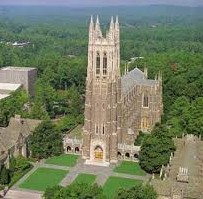 Over the past three years I have been at Duke, where I completed my ThM, overcame the GRE, and applied to PhD programs at American universities. During my time here, I have watched my fellow ThMer’s go on to begin doctoral work (both in the states and overseas––the latter typically the result of not being accepted in the states and thus looking overseas to simply begin their doctoral work) or abandon their original goal of pursuing a PhD. Although there are many reasons why some have chosen to seek alternative vocations, one reason that plays significantly into this decision is the gradual disillusion that Duke’s ThM is not what one anticipates. As I meet more and more incoming ThM students, I find that we all share similar frustrations, especially when these new students are midway through their first semester. It is these common frustrations that I would like to share in this post.
Over the past three years I have been at Duke, where I completed my ThM, overcame the GRE, and applied to PhD programs at American universities. During my time here, I have watched my fellow ThMer’s go on to begin doctoral work (both in the states and overseas––the latter typically the result of not being accepted in the states and thus looking overseas to simply begin their doctoral work) or abandon their original goal of pursuing a PhD. Although there are many reasons why some have chosen to seek alternative vocations, one reason that plays significantly into this decision is the gradual disillusion that Duke’s ThM is not what one anticipates. As I meet more and more incoming ThM students, I find that we all share similar frustrations, especially when these new students are midway through their first semester. It is these common frustrations that I would like to share in this post.
Let me begin by stating what Duke’s ThM program entails and by giving a few positive remarks about it. Duke’s ThM program is advertised (I’ll come back to this) as a one-year degree, which requires the completion of eight course, one of which is the thesis or exam (you get to choose, although the thesis is recommended). For those looking to begin PhD as soon as possible (which is everyone), this short, one-year degree is quite appealing. Another appealing feature is that there are no required courses for the ThM. That means that you are free to take whatever classes you want at Duke or UNC, given that they are related to your overall degree (thus, a course on 19th century Impressionism would not be approved). Anyone who has gone through an MDiv program (or ThM at DTS) will find this to be a tantalizing draw. A third attractive feature is that you do not have to (re)take the GRE, since a prerequisite for the program is that you already have a master’s degree (and presumably would have taken the GRE for that program, although this is not necessarily the case).
Unfortunately, the advertised one-year degree, the open-course selection, and the fact that the GRE is not required comes with some significant baggage and frustrations. First, Duke’s ThM program is the cash cow of the divinity school. That means that there is no funding available (zero!) for ThM students. This is a big deal considering that it costs $20k a year to attend.
And this brings us to one of the bigger frustrations of Duke’s ThM program: although it is advertised as a one-year degree, to finish all eight course in one year is quite difficult. Of the twelve ThM students of my class, only four finished within the year; NB, none of these classmates went on for PhD work! Those who finished within the year were focused on doing ministerial work and needed to get back to or begin their ministerial jobs (this is what the ThM is for, anyway). There is a big difference between these ThM students and those who are pursuing PhD work: the latter need to take as many doctoral seminars as possible to bolster their transcript, which means that taking four classes per semester, and writing your thesis in one of those semesters, is extremely difficult because the work load for a doctoral seminar is significantly greater than the work load for even upper-level master’s courses.
In addition to the difficulty of trying to finish all eight courses in one year, there is also the issue of entering this one-year degree with the aspiration of beginning a PhD program the very next fall. It is absolutely foolish to think that in half a semester a new student can demonstrate his or her worth to a professor, who would then turn around and write a meaningful recommendation letter for PhD applications. I would say that it takes at least two courses before a professor will really get to know a student’s PhD value (there are certainly those students who would prove me wrong, but to them I wonder why they are doing this degree in the first place and why they didn’t just apply directly to PhD programs). For me, my first semester was all about trying to impress professors, whose recommendations I needed later that semester. I failed miserably. My initial semester was filled with embarrassment, depression, and an overall sense incompetence. I did not rebound from this initial defeat until partway through my second semester, at which point I stopped trying to impress (which allowed me to start enjoying what I was learning rather than fretting over it), finally realized what it means to prepare for each class of a PhD-level course, and began to attend more reading groups and colloquiums, which allowed me to get to know professors and students outside of class. My point is this: for many who come into the ThM program, the first semester is a time for learning what it takes to be a PhD quality student. This takes time! The first semester, then, is not the time to ask for recommendation letters, which means that beginning a PhD program immediately after you finish your one-year ThM degree is not a realistic goal.
Overall, then, the advertisement of the ThM as a one-year degree is misleading for two reasons: for many, it takes more than one year to finish all eight courses and it fosters the unreasonable expectation of entering a PhD program immediately after finishing the ThM in one year. If you choose to enter Duke’s ThM program, enter with the mindset that it will take you one and a half to two years to finish. It is quite reasonable to think that you can begin a PhD program immediately after that second year.
If it takes you more than one year to finish, however, it will also cost you more than $20k. (Because pricing varies on the amount of courses you take per semester, you will need to contact the school to figure out how much a part-time load will cost.) Keep this in mind!
There is also the option of doing the MTS in the Divinity School (although I’m not certain that you can enter the MTS program if you already have a masters degree) or the MA in the Religion program. Both of these degrees have available founding and both are two years. The drawback for both of these programs is that the GRE is required. Also, there are mandatory course: for the MTS, there are eight required courses (basic courses like, Old and New Testament surveys, Church History, Christian Theology, etc.); for the MA, there is only one required course, “Theorizing Religion.”
In the end, each of these three degrees at Duke will prepare you for PhD work. There is an excellent faculty at both Duke and UNC that will work with you to help you achieve your academic goals. Yet, it is crucial that before you begin your journey at Duke that you are fully aware of precisely what it will take to reach these goals. The ThM program has been both a blessing and a curse for me––a $20k curse to be exact. I wish that I would have known these points of frustration prior to entering the program; not that it would have necessarily prompted me to look elsewhere for an equivalent degree, but that my family and I could have better prepared ourselves for what awaited us. (After spending six years completing my first ThM, it was truly a disheartening realization that I would not finish in one year, and this discouragement is shared by many other ThM students.) I share this information so that if you choose to enter Duke’s ThM program you will be better aware of what awaits you.



Hello, I am wondering if anyone can give me more information concerning the ThM program. Specifically, I have two questions: 1) are there pre-requisite competency exams for the languages? 2) Is there a modern language requirement? Thanks.
Hey Chris,
There are no language competency exams. If you sign up for a doctoral seminar then you will have to defend why you should be allowed in, which would mean you would list the language courses you have taken. There is no modern language requirement. When I did take doctoral level courses and there were articles assigned in German or French, I simply was not required to read it.
Let me know if you have any other questions.
Dan
Hi Dan, I found this helpful, thanks!
I’ll be finishing up at DTS also and considering applying to Duke for the ThM. Do you have any suggestions for where I can find some ‘nuts and bolts’ advice on filling out the application, specifically the short answers and personal essay?